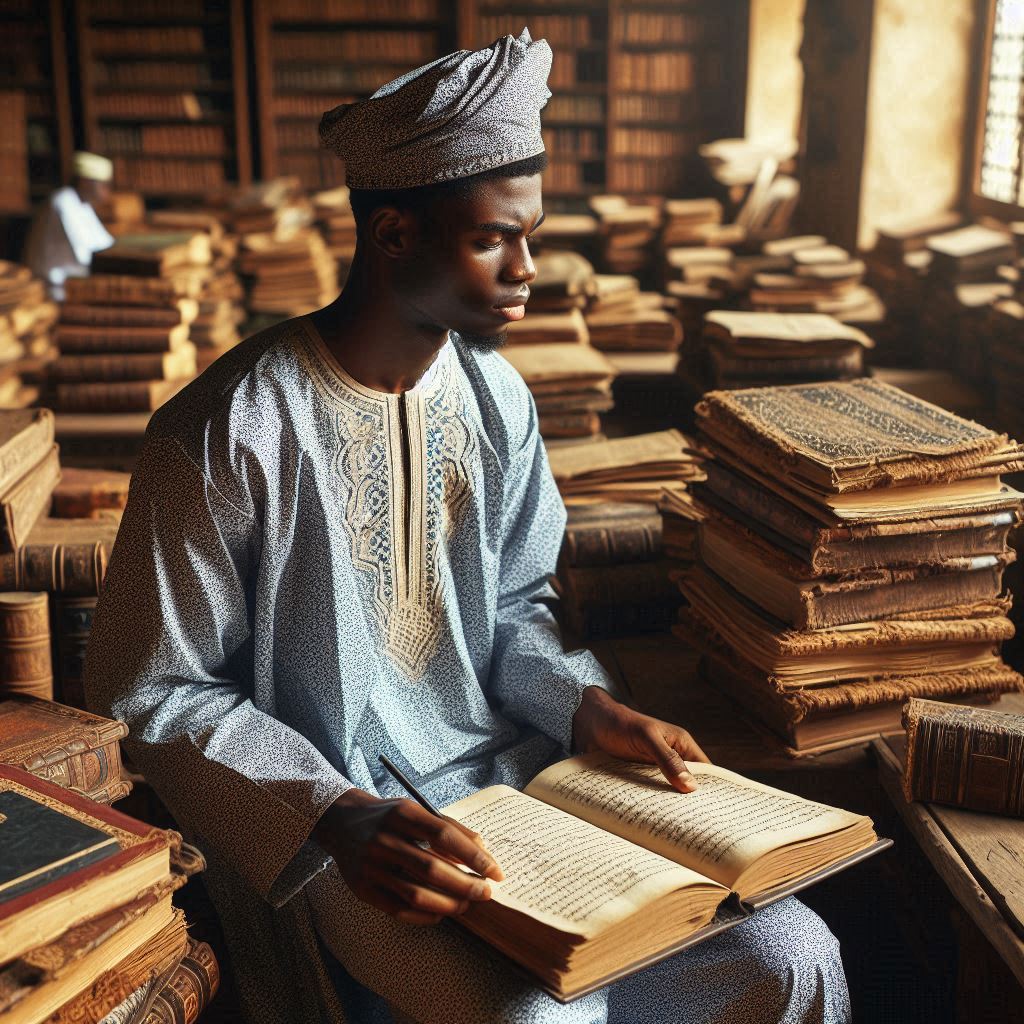Introduction
Globalization, the interconnectedness of societies, reshapes Nigerian historical studies in profound ways.
As the world becomes increasingly interconnected, the study of Nigerian history takes on new dimensions and challenges.
In this era of globalization, it is essential to redefine our approach to Nigerian historical studies, considering the broader global context in which historical events unfold.
By examining Nigerian history through the lens of globalization, we gain a deeper understanding of how global forces have shaped the country’s past and continue to influence its present and future trajectory.
Therefore, studying Nigerian history within the framework of globalization allows us to explore the interconnectedness of cultures, economies, and ideas, highlighting the complex interactions between local and global forces.
This section explores the impact of globalization on Nigerian historical studies and underscores the importance of studying Nigerian history within the context of globalization.
The impact of globalization on research methods
Globalization has significantly impacted research methods in Nigerian historical studies, bringing both challenges and opportunities.
Introduction of new research methodologies
One of the key impacts of globalization on Nigerian historical studies is the introduction of new research methodologies.
This includes the adoption of interdisciplinary approaches that combine history with other social sciences like sociology, anthropology, and political science.
By integrating diverse methodologies, researchers are able to gain a more comprehensive understanding of historical events and trends.
Access to global historical archives and databases
Globalization has also facilitated access to a wealth of historical archives and databases from around the world.
Nigerian researchers can now tap into international collections and repositories to enrich their research projects.
This access to diverse sources enables scholars to explore new perspectives, challenge existing narratives, and uncover previously unknown information about Nigerian history.
Collaboration with international scholars and institutions
Another significant impact of globalization on Nigerian historical studies is the opportunity for collaboration with international scholars and institutions.
This has led to joint research projects, academic exchanges, and partnerships that enhance the quality and scope of historical research in Nigeria.
By working with experts from other countries, Nigerian researchers can bring fresh perspectives, expertise, and resources to their studies.
Essentially, globalization has brought about a paradigm shift in research methods in Nigerian historical studies.
The introduction of new methodologies, access to global archives, and collaboration with international scholars have enriched the field and opened up new possibilities for exploring and understanding Nigeria’s history.
Read: Language Arts Courses: What to Expect in Nigeria
Cultural Exchange and Influence
The impact of globalization on Nigerian historical studies has led to significant cultural exchange and influence.
This exchange has both positive and negative effects on the study of Nigerian history.
Spread of Western Values and Ideologies
One of the major impacts of globalization on Nigerian historical studies is the spread of Western values and ideologies.
With the rise of globalization, Nigerian historical narratives have become influenced by Western perspectives.
This influence has led to a shift in how Nigerian history is interpreted and understood.
The introduction of Western values has affected the way Nigerian historians research, analyze, and present their findings.
Preservation of Nigerian Cultural Heritage
Despite the influence of Western values, globalization has also played a role in the preservation of Nigerian cultural heritage.
The interconnectedness brought about by globalization has enabled Nigerian historians to access and preserve their cultural heritage.
Nigerian historical studies have benefited from globalization as it has allowed for the sharing of knowledge and information about Nigerian culture and history.
This exchange has helped to safeguard and promote Nigeria’s rich historical and cultural heritage.
Influence of Globalization on Nigerian Historical Narratives
Globalization has had a profound impact on Nigerian historical narratives.
The interconnected nature of the world today has led to a diversification of historical perspectives and interpretations.
Nigerian historians are now able to draw upon a wide range of sources and viewpoints to enrich their historical narratives.
This has led to a more comprehensive and nuanced understanding of Nigerian history, encompassing a variety of voices and perspectives.
Overall, globalization has had a complex and multifaceted impact on Nigerian historical studies.
While it has brought about the spread of Western values and ideologies, it has also facilitated the preservation of Nigerian cultural heritage and enriched historical narratives with diverse viewpoints.
Nigerian historians must navigate these complexities to ensure a balanced and inclusive understanding of their country’s history.
Read: Student Experiences: Life in Communication Arts
Economic impact
Globalization has had a profound impact on the economic aspects of Nigerian historical studies.
Integration of Nigerian history into global economic frameworks
Globalization has opened up opportunities for Nigerian historical studies to be integrated into global economic frameworks.
This has allowed for the exploration of historical events and narratives that have economic implications and significance on a global scale.
By studying Nigerian history in relation to global economic trends, researchers can gain a deeper understanding of the economic forces that have shaped the country over time.
Tourism and Heritage Preservation
One of the key economic impacts of globalization on Nigerian historical studies is the promotion of tourism and heritage preservation.
As Nigeria’s history becomes more widely known and appreciated on a global scale, there is an increased interest in visiting historical sites and museums in the country.
This has led to a boost in tourism revenue and the preservation of Nigeria’s rich cultural heritage.
Globalization has made it easier for international tourists to access information about Nigeria’s history and heritage, leading to an increase in cultural exchanges and economic benefits for the country.
Economic implications of global historical studies on Nigeria
Global historical studies on Nigeria have economic implications that extend beyond tourism and heritage preservation.
By studying Nigerian history within a global context, researchers can uncover economic patterns, trade relationships, and historical events that have influenced the country’s economic development.
This knowledge can be used to inform economic policies, attract foreign investment, and foster international trade partnerships.
As Nigeria continues to engage with the global community, understanding the economic implications of its historical studies becomes increasingly important for shaping its economic future.
Read: Communication Arts: Balancing Theory and Practice

Find Out More: Women in Arabic and Islamic Studies Nigeria
Educational implications
Introduction of global perspectives in historical studies curriculum
Globalization has brought new perspectives to the field of historical studies in Nigeria.
Educators are now incorporating global viewpoints into the curriculum to provide a more comprehensive understanding of historical events.
By studying history from a global perspective, students can gain insights into how different countries and cultures have influenced each other throughout history.
Opportunities for international exchanges and study programs
Globalization has also created opportunities for Nigerian students to participate in international exchanges and study programs.
This allows students to immerse themselves in different cultures and gain a deeper understanding of global historical events.
By studying abroad, students can broaden their perspectives and gain valuable insights that they can bring back to their own country.
Challenges in balancing global and local historical narratives
Despite the benefits of incorporating global perspectives into historical studies, there are challenges in balancing global and local historical narratives.
It is important for educators to strike a balance between teaching global history and preserving the unique historical narratives of Nigeria.
By doing so, students can develop a more comprehensive understanding of both global and local historical events.
Essentially, the impact of globalization on Nigerian historical studies has brought about educational implications that require careful consideration.
By introducing global perspectives in the curriculum, providing opportunities for international exchanges, and addressing challenges in balancing global and local narratives, educators can ensure that students receive a well-rounded historical education that reflects the interconnected nature of the world.
Read: Introduction to African and Asian Studies in Nigeria
Learn More: How Nigerian Arts Shape National Identity
Gain More Insights: The Role of Foreign Languages in Nigerian Business
Find Out More: Fine and Applied Art Courses: What to Expect
Political implications
Impact of Globalization on National Identity and Historical Consciousness
Globalization presents a double-edged sword for Nigerian national identity and historical consciousness.
While it fosters interconnectedness and cultural exchange, it also challenges traditional notions of identity and historical narratives.
The influx of global media, technology, and consumer culture has led to the blending of local and foreign influences, shaping a new hybrid identity for many Nigerians.
This fusion of cultures has prompted a reassessment of historical narratives and the construction of a more inclusive national identity that acknowledges Nigeria’s place in the global community.
Influence of Global Historical Events on Nigerian Politics
Global historical events exert a profound influence on Nigerian politics, shaping government policies and decision-making processes.
Economic crises, such as the global financial meltdown of 2008, have far-reaching implications for Nigeria’s economy, leading to policy adjustments and reforms.
Similarly, geopolitical conflicts and alliances on the world stage directly impact Nigeria’s diplomatic relations and foreign policy decisions.
For example, Nigeria’s involvement in peacekeeping missions in conflict zones abroad reflects its commitment to global stability and security.
Role of Historical Studies in Shaping National Policies and International Relations
Historical studies play a pivotal role in shaping national policies and international relations.
By examining past experiences, policymakers gain valuable insights into the successes and failures of previous strategies, enabling them to make informed decisions for the future.
Understanding historical contexts is crucial for crafting effective policies that address contemporary challenges while drawing on lessons from the past.
Moreover, historical narratives shape diplomatic relations and international engagements, as Nigeria’s historical ties with other nations influence its approach to foreign affairs.
By leveraging its historical legacy, Nigeria can forge stronger partnerships and collaborations on the global stage, enhancing its influence and reputation as a key player in international affairs.
Therefore, globalization reshapes Nigerian historical studies in multifaceted ways, influencing national identity, politics, and international relations.
Embracing this globalized perspective allows Nigeria to navigate the complexities of the modern world while honoring its rich historical heritage.
By integrating global insights with local knowledge, Nigeria can chart a course towards a brighter and more prosperous future, grounded in a deep understanding of its past.
Explore Further: The Role of Sound Design in Nigerian Film Production
Delve into the Subject: Prominent Nigerian Art Galleries and Museums
Conclusion
Lastly, our exploration of the impact of globalization on Nigerian historical studies reveals a complex interplay of factors.
We have seen how globalization influences national identity, politics, and international relations, challenging traditional narratives and reshaping historical consciousness.
Studying Nigerian history within the context of globalization is imperative for understanding the nation’s past, present, and future trajectory.
Moving forward, the field of Nigerian historical studies faces both prospects and challenges.
On one hand, globalization offers opportunities for cross-cultural exchange, collaboration, and the integration of diverse perspectives into historical discourse.
On the other hand, it presents challenges such as the erosion of local traditions, the homogenization of culture, and the marginalization of indigenous voices.
As historians, researchers, and policymakers, we must navigate these complexities with sensitivity and foresight.
Preserving cultural heritage, fostering critical dialogue, and promoting inclusivity are essential to ensuring that Nigerian historical studies remain relevant and vibrant in the era of globalization.
By embracing diversity and engaging with global trends, we can chart a course towards a more inclusive and nuanced understanding of Nigeria’s rich and diverse history.




